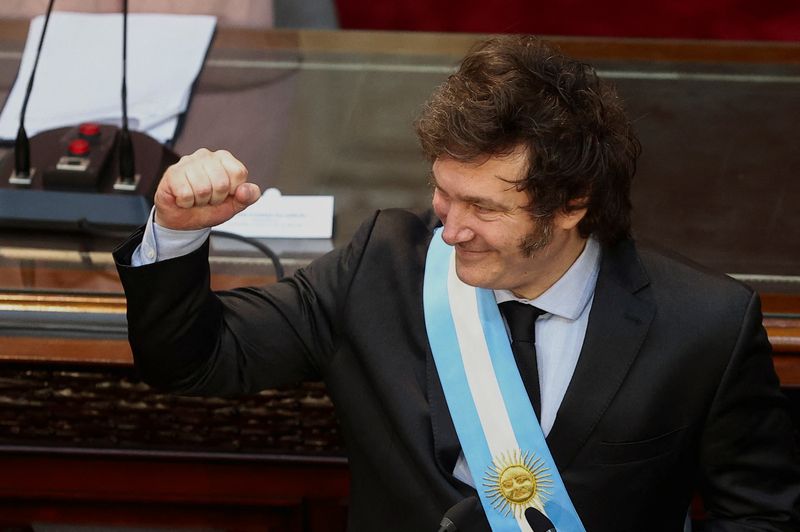By Kylie Madry and Maximilian Heath
BUENOS AIRES (Reuters) -Argentine President Javier Milei vowed to "speed up" his plans to overhaul the country and solve its economic woes in a fiery speech to Congress on Friday, challenging them to pass a new package of bills after an earlier version of his "omnibus" reform was rebuffed last month.
Milei, speaking to lawmakers in a state-of-the-union style address, took an aggressive tone, inviting Congress to join him but warning that he would make changes with or without the legislature.
"We won't back down, we're going to keep pushing forward," Milei said. "Whether that's by law, presidential decree or by modifying regulations."
The speech underscored Milei's determination to push ahead with divisive economic reforms and austerity measures that have boosted markets but have sparked protests, including outside of Congress on Friday, and pushback among lawmakers.
Milei's proposals include slashing government spending on politicians, including benefits such as private jets. He would also cut federally provided perks for politicians convicted of corruption a second time, he said.
The political outsider took office in December looking to take a "chainsaw" to the country's status quo as the nation faces economic crisis. He frequently clashes with those he regards the political elite and paints them as the "caste" who enjoy excessive job perks.
Inflation over 250%, which predates Milei but rose after he devalued the peso currency sharply in December, has pushed up poverty levels seen nearing 60%, raising tensions among workers and unions - with Milei vowing on Friday to limit terms of union leaders - and prompting more strikes and protests.
"If we don't change the economic model from the very roots, then Argentina has no future," Milei exclaimed.
He added he would send a bill to penalize anyone - including a president, economy minister or lawmaker - who signed off on financing a fiscal deficit by printing more money.
Milei, pausing frequently amid cheers from his bloc, told Congress that if they opposed him in his bid for change, they would face a "different type of animal."
He then took a more conciliatory tone in addressing local governors as he proposed a 10-point "social pact" to be agreed on May 25, asking them to move past recent pain points.

The pact, which is dependent on the passage of Milei's reform and a fiscal overhaul, includes a "re-discussion" of the current, "extortionate" framework of distributing tax funds between the federal government and the provinces, Milei said.
Last month, the oil-and-gas-rich provinces in the south and the powerful Buenos Aires province threatened to cut energy supplies and to take their complaints to the Supreme Court after the central government held back funds, citing debts owed.